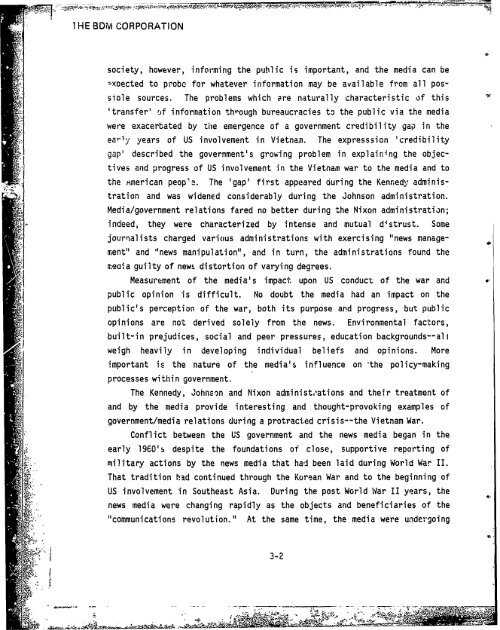policy - The Black Vault
policy - The Black Vault
policy - The Black Vault
You also want an ePaper? Increase the reach of your titles
YUMPU automatically turns print PDFs into web optimized ePapers that Google loves.
1 HE BOM CORPORATION<br />
society, however, informing the public is important, and the media can be<br />
-xDected to probo for whatever information may be available from all possiole<br />
sources. <strong>The</strong> problems which are naturally characteristic of this<br />
'transfer' oif information through bureaucracies to the public via the media<br />
were exacerbated by the emergence of a government credibility gap in the<br />
early years of US involvement in Vietnam. <strong>The</strong> expresssion 'credibility<br />
gap' described the government's growing problem in explaining the objectives<br />
and progress of US involvement in the Vietnam war to the media and to<br />
4 tration and was widened considerably during the Johnson administration.<br />
Media/government relations fared no better during the Nixon administration;<br />
the American peop'½. <strong>The</strong> 'gap' first appeared during the Kennedy adminis-<br />
indeed, they were characterized by intense and mutual d-strust. Some<br />
journalists charged various administrations with exercising "news management"<br />
and "news<br />
manipulation", and in turn, the administrations found the<br />
;ea ia guilty of news distortion of varying degrees.<br />
Measurement of the media's impact upon US conduct of the war and<br />
public opinion is difficult. No doubt the media had an impact on the<br />
public's perception of the war, both its purpose and progress, but public<br />
opinions are not derived solely from the news. Environmental factors,<br />
built-in prejudices, social and peer pressures, education backgrounds--all<br />
weigh heavily in developing individual beliefs and opinions. More<br />
important is the nature of the media's influence on 'the <strong>policy</strong>-making<br />
processes within government.<br />
<strong>The</strong> Kennedy, Johnson and Nixon administ,'ations and their treatment of<br />
and by the media provide interesting and thought-provoking examples of<br />
government/media relations during a protracted crisis--the Vietnam War.<br />
Conflict between the US<br />
government and the news media began in the<br />
A,. early 1960's despite the foundations of close, supportive reporting of<br />
military actions by the news media that had been laid during World War II.<br />
That tradition had continued through the Korean War and to the beginning of<br />
US involvement in Southeast Asia. During the post World War II years, the<br />
news media were changing rapidly as the objects and beneficiaries of the<br />
"communications revolution."<br />
At the same time, the media were undergoing<br />
3-2<br />
i~AN
















